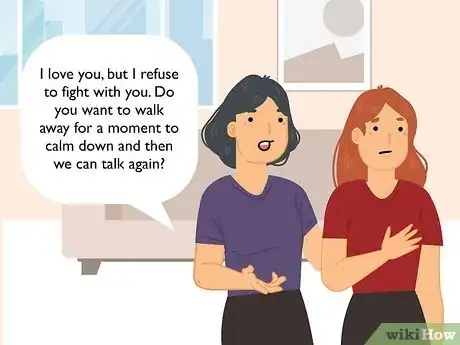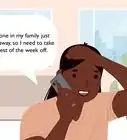This article was co-authored by Klare Heston, LCSW. Klare Heston is a Licensed Independent Clinical Social Worker based in Cleveland, Ohio. With experience in academic counseling and clinical supervision, Klare received her Master of Social Work from the Virginia Commonwealth University in 1983. She also holds a 2-Year Post-Graduate Certificate from the Gestalt Institute of Cleveland, as well as certification in Family Therapy, Supervision, Mediation, and Trauma Recovery and Treatment (EMDR).
This article has been viewed 25,830 times.
The hurt of having a child who won’t speak to you is deep and can dramatically affect your happiness. Perhaps you and your child had a falling out or an argument erupted that got out of hand. No matter the cause, the pain of this alienation can be difficult. You can cope with this estrangement by focusing on self-healing and moving forward with your life.
Steps
Healing the Hurt
-
1Reflect on the estrangement honestly. It can be easy to look back on your history with your child with rose colored glasses, absolving yourself of guilt, or saying that you’re a better parent than most. However, this will not fix the issue nor help you to cope. Think honestly about your relationship, about the times you have hurt your child, and the times that they have hurt you.[1]
- Write down your thoughts in a journal.
- Talk to someone you trust who might be able to point out issues you never considered.
-
2Acknowledge your feelings. During this time, do not deny your feelings of hurt. Allow yourself to feel them. Coping with this alienation will be a continual process unless your relationship is repaired, but stifling your emotions will only allow the hurt to deepen and fester.[2]
- Allow yourself to cry.
Advertisement -
3Avoid rumination. This estrangement might consume your thoughts, but do what you can to avoid harping on it. You should be talking to your friends and family about your difficulty coping, but avoid making that the sole or main topic of conversation. Distract yourself from obsessing over it by engaging in activities that you enjoy.[3]
- Set a time limit daily to think about the estrangement and then commit to doing other things afterwards.
- Read a book, watch TV, or go out to get your mind off things.
- Physically active things and creative endeavors are an especially good idea.
-
4Focus on the good in your life. Make a list of all of the things in your life that are good despite your child’s alienation of you. Perhaps you enjoy your job, have a good spouse or close friends, or are involved in a church that you love. Spend time attending to these blessings and expressing gratitude for them.[4]
- Tell your spouse that you love them and do kind things for them.
- Plan things with your friends.
- Set goals for yourself at home and at work.
-
5Practice self-care. During this time, do not forget to care for yourself. The better cared for you are, the better you will feel. Exercise, eat well, and practice the hobbies that you enjoy. Take a hot bath or check off some items on your bucket list.[5]
- Set aside time each day that is just for you.
- Some days you will need to devote more time to your self-care. For example, if there has been a recent negative interaction with your child, then you might need to spend some more time on self-care.
-
6Seek professional counseling. You might find that your feelings of sadness over your relationship with your child are overwhelming you. Seek counseling to cope with these feelings. Your counselor will be able to help you work through your issues while providing you with coping strategies.[6]
Moving Forward
-
1Write a letter. Letter writing can be a very cathartic process and can help you express your feelings without fear of interruption or yelling. If your child is not speaking to you, write them a letter saying all the things you want them to know. Talk about your relationship in the past, what you have done wrong, and what you would like to have with them moving forward. Apologize for any hurt you have caused them.[7]
- Mail the letter or give it to a relative to deliver to them.
- You can also choose to keep the letter. This is a great way to get your feelings out without fear of rejection from your child should they not reach out.
-
2Say “I love you.” In this process, it can be freeing for you to continue doing and sayings things that you would to your children if your relationship were not in disrepair. Let them know that you love them. Knowing that they know this will help you to feel better and move forward.
- You can also show your love through performing random acts of kindness for them.
-
3Let go of your ego. If your child has been mean or disrespectful to you, it might feel tempting to follow suit. However, avoid being petty and take the high road instead. Don’t allow your pride to further damage your relationship with your child.[8]
-
4Avoid fighting. This is key in reestablishing peace in your life. If your child tends to only engage with you when they are being insulting, yelling, or cursing, do not engage. Remember that you are still their parent and you set the tone for the relationship. You are still supposed to be an example to them, even if they are being disrespectful.
- You can say “I love you, but I refuse to fight with you. Do you want to walk away for a moment to calm down and then we can talk again?”
- There might be times when you have to accept that a pause in communication is the best. Turn to your self-care at these times.
- If the situation escalates to violence, leave immediately and call for help if necessary.
-
5Never stop trying. Despite the circumstances, never stop trying to have a relationship with your child. You will be better able to cope if you know that you are doing your part to fix the relationship. Continue to reach out regularly and try to make plans with them.[9]
- Send them birthday cards to let them know you care and have them in your thoughts.
-
6Keep hope alive. You may be feeling like your situation with your child is hopeless, but it is not. No matter how bad things are, there is always hope of improvement or change. Don’t wallow or be pessimistic about the situation; instead, be positive and open to reconnection in the future.[10]
- Sometimes things change and tensions lessen over time. Life is not static. Perhaps your adult child recently became a parent, and they are more receptive.
-
7Forgive and accept them. Though it can be difficult, you must forgive yourself and your child. Accept them and their decisions even if they are not being very kind or reasonable. Write down your feelings and worries on a piece of paper and burn it, letting go of your anxiety surrounding the issue.[11]
References
- ↑ http://www.huffingtonpost.com/karl-a-pillemer-phd/parents-estranged-children_b_7297294.html
- ↑ http://www.rejectedparents.net/five-ways-to-move-on-after-an-adult-childs-rejection/
- ↑ http://www.rejectedparents.net/five-ways-to-move-on-after-an-adult-childs-rejection/
- ↑ http://www.rejectedparents.net/five-ways-to-move-on-after-an-adult-childs-rejection/
- ↑ http://www.rejectedparents.net/five-ways-to-move-on-after-an-adult-childs-rejection/
- ↑ http://www.huffingtonpost.com/karl-a-pillemer-phd/parents-estranged-children_b_7297294.html
- ↑ http://www.nextavenue.org/estranged-parents-and-adult-children-silent-epidemic/
- ↑ http://www.huffingtonpost.com/karl-a-pillemer-phd/parents-estranged-children_b_7297294.html
- ↑ http://www.huffingtonpost.com/karl-a-pillemer-phd/parents-estranged-children_b_7297294.html









































































